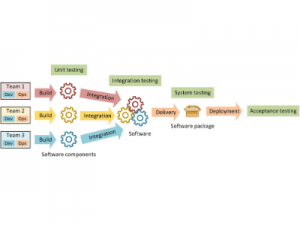
Devops is not only for fresher it can also a good choice for expereinced people carrers.
The market’s demand for DevOps has risen, resulting in a higher demand for a professional DevOps staff. Almost every organisation is using cloud services for its operations, which necessitates the hiring of professionals. If you come from an IT background, studying DevOps is a must-have skill to begin your career.
DevOps has a bright future ahead of it, with multiple answers to IT issues. There’s no denying that DevOps professionals are well compensated and diligent. DevOps is a fantastic strategy that many IT organisations are currently using to give more dependable and faster solutions to their customers.
Also See: A Complete Guide for Beginners on DevOps Tutorial
What exactly is DevOps?
Before diving into the reasons for studying DevOps, it’s important to understand what DevOps is. DevOps is a method or process that brings together the development and IT teams to interact throughout the software development cycle, ensuring that everyone is on the same page. It speeds up the SDLC (software development life cycle) and ensures high-quality software delivery.
Why should you learn DevOps ?
DevOps’ future potential is bright and growing by the day. Many businesses are adopting this strategy as new tools and technologies become available. There could be a variety of compelling reasons for you to pursue DevOps training this year.
Where Can You Start Your Journey in DevOps?
You can start on your learning path with the DevOps basics. This course is designed to offer a real-world, practical understanding of continuous development and deployment, automation of configuration management, inter-team collaboration, & IT service agility. Best of all, you can begin from your home or office, since Simplilearn’s programs are entirely online.
Also See: A Complete Guide to Learn on Python Tutorial Programming Language
DevOps Lifecycle
DevOps reflects a deep integration of production and operations. It’s not possible to understand DevOps without understanding the DevOps lifecycle.
Here are brief details about the Life-cycle of Continuous DevOps:
1. Development: In this stage of DevOps the software development is constantly taking place. During this step, the entire process of development is divided into small cycles of growth. This assists the DevOps team is speeding up the process of software development and delivery.
2. Testing: To find and fix bugs in the latest piece of code, the QA team uses tools like Selenium.
3. Integration: New software is incorporated with the prevailing code at this level, and testing is carried out. Only continuous integration and testing allows for continuous development.
4. Deployment: In this step, the process of implementation is continuously taking place. It is carried out in such a way that any changes made in the code at any time should not affect the high traffic website’s functioning.
5. Monitoring: The Service team will take care of improper device actions or bugs that are encountered in development during this process.
Also see: Microsoft Cloud Service Map for AWS and Azure
List of DevOps Tools
DevOps tools help firms to resolve some of the challenges that come with the implementation of DevOps practices. However, there is no “one-size-fits-all” solution available out there. As a result, there is a wide variety of DevOps tools for every requirement.
1.GitHub: Github is considered as one of the largest and most advanced development platforms in the world. Millions of developers and companies build, ship, and maintain their software on GitHub. Some of its’ salient features are:
- Collaborative Coding
- Automation / CI & CD
- Security including additional features for enterprise customers
- Project Management
2.Bitbucket: Bitbucket is a very popular platform, with over 10 million registered users. Although it is a platform for hosting code, it goes beyond just code management. Teams can plan projects, collaborate on code, test, and deploy from a single platform. Some of its features are:
- Tighter Jira and Trello integration.
- Integrated CI/CD to build, test and deploy.
- Pull requests and approve code review more efficiently.
- Keep your code secured in the Cloud with IP whitelisting and 2-step verification.
3.GitLab: It is an all-in-one DevOps Tool for rapid software delivery. It enables teams to perform all tasks right from Planning to SCM to Delivery to Monitoring and Security. Following are a few of its features:
- Single interface, single conversation thread, and single data store to manage projects effectively – Single source of truth.
- CI/CD for robust, scalable, and end-to-end automation to work together efficiently – Continuous Everything.
- Built-in functionality for Automated Security, Code Quality and Vulnerability management & with tight governance, your DevOps speed never slows down.
4.Selenium: Primarily used to automate web applications for testing purposes but can, also, be used to automate other web-based admin tasks. Three components:
- Selenium WebDriver allows you to create robust, browser-based regression automation suites and tests and helps you in scaling and distributing scripts across many environments.
- Selenium IDE is a chrome and Firefox add-on that helps in simple record-and-playback of interactions with the browser.
- Selenium Grid for scaling your testing efforts by running tests on several machines and manage multiple environments from a central point
5.Jenkins: Written in Java, Jenkins is an open-source platform for continuous integration and continuous delivery that is used to automate your end-end release management lifecycle. Jenkins has emerged as one of the essential DevOps Tools because of its features:
- Used as a simple CI server or turned into the CD hub for any project.
- Easily set up and configured via its web interface, which includes on-the-fly error checks and built-in help.
- Easily distribute work across multiple machines, helping drive builds, tests and deployments across multiple platforms faster.
6.Splunk: Splunk is a monitoring and exploring tool that is used on SaaS and on-premises. It has features like:
- Monitor and troubleshoot across your infrastructure, including physical, virtual, or in the cloud.
- Modernize applications for better customer experiences through accelerated innovation.
- AIOps with Machine Learning for predictive alerting and auto-remediation.
- Improved Efficiency in MTTA with mobile-first, automated incident response.
Also See: The Beginner’s Guide to Content Management Systems (CMS) Tutorial
With the DevOps approach in place, any firm can easily automate processes ranging from simple to complicated. Software is a vital component for businesses, and offering high-quality software to clients is a necessary in order to stay competitive. As a result, software automation has become a requirement for IT firms looking to expand their operations. The SDLC process is more efficient and simpler with automation.
2. Effective Security
When you automate your system or application, security issues rise. With automation, there is a greater likelihood of difficulties arising. As a result, all automation should be done in a more regulated manner, which may be accomplished through the use of DevOps approach. During the development and testing phases, it ensures that the programme is secure. The integrity of the application is preserved by using DevOps to deploy security policies.
3.The future of DevOps
According to surveys and studies, DevOps has produced several employment in recent years and will continue to do so in the following year. As businesses become more computerised, the demand for DevOps has skyrocketed. The DevOps methodology is increasingly critical to the future of IT firms, making it the most demanding profession. Within the previous five years, the market has increased by 40–45%, increasing DevOps demand.
4. Container innovation
Container technology has a number of advantages, one of which is the ability to sandbox application security. It’s a form of packing that lets a programme to run with its own holding. The use of container technology in DevOps will improve the security and performance of the system. This technology is currently being researched and developed, with the goal of making the system more cost-effective.
5. Improve the product’s quality
DevOps has improved product development while also lowering the risk of failure. DevOps has optimised the pipeline workflow so that high-quality software may be built with fewer resources. During the development, testing, and deployment phases of a programme, it eliminates security issues.
6. DevOps and AI/ML integration
DevOps has altered the landscape of software development. However, artificial intelligence and machine learning can help you automate your application in a far more controlled manner. People are increasingly turning to AIOps and data ops, which offer a cost-effective way to automate an entire working pipeline.
Also See: Find Your Android Device ID in Your Smartphone
Google Search volume for DEVOPS


Reasons to learn DevOps for Freshers
The increasing demands have provided many reasons to learn and adopt DevOps . Below are a few reasons.
1.Become a company’s most valuable asset
Learning DevOps will provide you access to a wide range of tools and technologies. To cut expenses, companies desire trained and experienced personnel with different skill sets. You will be a significant asset to your firm if you are a DevOps expert. You’ll learn how to use various tools and implement solutions more quickly and efficiently if you learn DevOps.
2. Allow for quicker release cycles
DevOps guarantees that the SDLC process remains agile and that software is delivered on schedule. User behaviour can be evaluated using the DevOps technique in order to make more changes and better software. This is only achievable with the use of a variety of DevOps technologies.
3. In the present technical job market, it is a wise career decision.
DevOps is currently a prominent career path. According to Forbes magazine research, a DevOps specialist with a high school diploma may earn a median pay of about $106,734. Although your income will vary depending on your position, the average pay for the various positions is not drastically different. A DevOps Release Manager, for example, makes $92K on average, a Site Reliability Engineer $125K, and a DevOps Engineer $115K. According to studies, DevOps will be the primary employment factor for 46 percent of IT businesses in the future years.
4. Compatibility with a variety of tools
Many technologies from a variety of platforms and frameworks can be simply integrated into the DevOps lifecycle phases. These technologies make it easier to work on any platform and at every stage of the software development cycle. Git, Jenkins, Selenium, Docker, Kubernetes, Ansible, Terraform, Puppet, and others are just a few of the tools available.
5. Improve SDLC knowledge
The SDLC includes numerous phases, and DevOps can help you understand each one thoroughly. If you are a member of the developer team, you are still aware of the testing and production processes. This knowledge is not restricted to a single team; each tiny group is familiar with the operations of the other. From development to software deployment, the DevOps strategy ensures that everyone in the team is on the same page.
6. To improve your professional reputation
Learning DevOps will give you understanding of new tools and technologies, which will increase your chances of getting a higher-paying job. Simple solutions can be used to even the most complicated IT issues without compromising software quality. Companies are increasingly looking for employees with DevOps skills, thus it’s never been a better time to learn and get certified in DevOps.
Also see: A Comprehensive Guide to the Internet of Things ( IoT)
Conclusion
DevOps is helping businesses in a tremendous way. It’s bridging the gap between developers’ need for change and operations’ resist to change and thus creates a smooth path for Continuous Development and Continuous Integration



